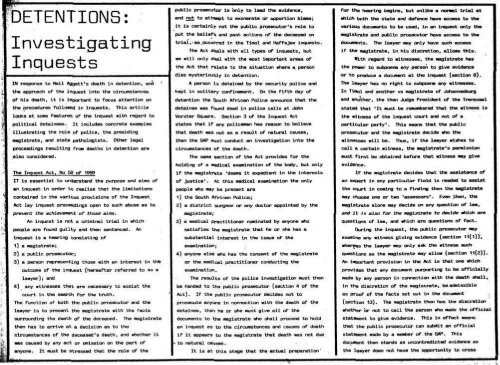You also want an ePaper? Increase the reach of your titles
YUMPU automatically turns print PDFs into web optimized ePapers that Google loves.
[DETENTIONS:<br />
Investigating<br />
Inquests<br />
IN response to Neil Agpatt's death In detention, and<br />
the approach of the inquest into the circumstances<br />
of his death, it is important to focus attention on<br />
the procedures followed in inquests- This article<br />
looks at some features of the inquest with regard to<br />
political detainees. It includes concrete examples<br />
illustrating tha role of police, the presiding<br />
magistrate, and state pathologists. Other legal<br />
proceedings resulting from deaths in detention are<br />
also considered.<br />
The Inquest Act, Wo 5ft^of 1950<br />
IT ia essential to understand the purpose and alma of<br />
an Inquest in order to realise that the limitations<br />
contained in the various provisions of the Inquest,<br />
Act lay inquest proceedings open to such abuse as to<br />
prevent tha achievement of those aims.<br />
An Inquest Is not a criminal trial in ahlch<br />
people are found guilty and than sentenced. An<br />
inquest is a hearing Consisting of<br />
1) e magistrate;<br />
2) a public prosecutor;<br />
3) a parson representing those aith an interest in the<br />
outcome of the inquest (hereafter referred to MM a<br />
lawyer); and<br />
4) any witnesses that are necessary to assist the<br />
court in the search for tha truth.<br />
The function of both the public prosecutor and the<br />
lawyer is to present the magistrate with the facts<br />
surrounding tha death of tha deceased* The magistrate<br />
than has to arrive at a decision as to the<br />
circumstances of the deceased's death, and whether it<br />
aas caused by any act or omission on the part of<br />
anyone. It oust be stressed that the role of tha<br />
public prosecutor is only to lead the evidence,<br />
and not to attempt to exonerate or apportion blame;<br />
it is certainly not the public prosecutor's role to<br />
put the beliefs and past actions of the deceased on<br />
trial,

















